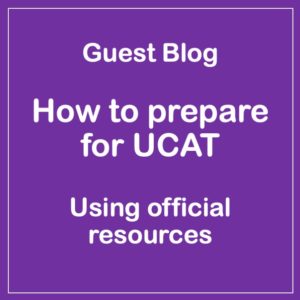 This guest blog is written by Ka Yuet Kenneth Au-Yeung, a Medical Student at the University of Birmingham and a member of Birmingham Widening Access to the Medical Sciences.
This guest blog is written by Ka Yuet Kenneth Au-Yeung, a Medical Student at the University of Birmingham and a member of Birmingham Widening Access to the Medical Sciences.
How to prepare for UCAT with official resources
The UCAT is an aptitude test that is required for up to 30 medical schools in the UK. To improve your chances of getting in, you should really prepare well for the test to improve your chances! Here is a quick overview of how to use the official resources.
What?
There are a lot of UCAT resources available online to help you prepare for the test. We will focus on the resources that are easily accessible on the official website. These are completely free of charge.
UCAT have created their own youtube channel, with a few short videos about the test itself. There is also the official UCAT guide which you should definitely read to understand more about the test and how to prepare for it. More importantly, the website provides a detailed tutorial about how to approach the different sections of the test. Finally, you can put these skills into practice with the mock tests available. More questions can also be found on the UCAT official app as well as on their Instagram page.
Where?
These resources are available on the official UCAT website. Follow this link: https://www.ucat.ac.uk/ucat/practice-tests/
When?
The general advice is to start preparing for the test 6 weeks prior to the test date. However, it is definitely possible to start preparing even earlier than that. Before starting your intense practice and revision, you can always read up on the test and try to familiarise yourself with it. Be prepared to write out a plan for those 6 weeks as well. You can always learn about the different sections of the test; identifying your strengths and weaknesses early on! That allows you enough time to read up and practice in those areas you feel less confident in. It is more effective if you can allocate more time to work on these areas before starting the 6-week revision period.
How?
This is the main point of this blog. So how can you use these resources?
It goes without saying that there is not a single way to work. It all depends on yourself, so spend some time to try out different methods of learning to find out your most effective way of learning.
Within the official guide, there is a clear preparation timeline that you can follow. Their general advice is to spend 25 to 30 hours to prepare for the test, but it really does vary a lot. Do not feel bad if it takes you way longer than that to prepare, there is nothing wrong with that!
One of the best ways to prepare for the test is to read. It doesn’t have to be relevant to your academics or your career; try to read as much as you can under time pressure. This improves your ability to identify important information within a short period of time and is especially important for the verbal reasoning section. This should be part of your long-term preparation.
You should also read the Good Medical Practice document published by the General Medical Council (GMC). You should start reading this early on and try to read it more frequently rather than leaving it behind for a long time. It is very useful as it improves your understanding of the ethical considerations in different situations, which is what the Situational Judgment section assesses.
Around 6 to 8 weeks before the actual test, you can start doing the tutorials on the official website. You should aim to familiarise yourself with the different approaches to a question and to start working under time pressure. This is also a good opportunity to practise doing a computer-based exam, since you may be used to doing exams with pen and paper. Different gadgets such as flagging questions as well as the on-screen calculator requires some practice and you should be confident in using them. There are a few mock exams; you should do them whenever you are comfortable, but you should save one (or two) to do closer to the day of the actual test.
Once you are confident with the basics, you should aim to create strategies for yourself that will save you time. For instance, you can form acronyms for yourself that will quickly remind you of the things to look out for or the techniques required to identify the correct answer. I can almost guarantee you that the UCAT will be one of the most time pressured tests you will ever take in your life! So, any time saving technique is very precious and will definitely help boost your results.
Remember that this is just some general advice. It most definitely won’t work for everyone so you should take the initiative to find out your best way of learning! Good luck!
By Ka Yuet Kenneth Au-Yeung
A huge thanks to Kenneth for all the time and effort he put into putting this blog together.
For more information about BWAMS activities and support follow these links:
Web: https://www.bwams.co.uk
You Tube: https://www.youtube.com/channel/UCHqZQfiHG-DjHS2h_CZ8voQ
Twitter: @BWAMSbirmingham and @we_are_medics
Instagram: @bwamsbirmingham and @wearemedics
MDS Outreach can be found using the following links:
Web: www.birmingham.ac.uk/MDSOutreach
Twitter: @UoB_MDSOutreach
Instagram: @uob_mdsoutreach
Blog: https://blog.bham.ac.uk/mds-outreach/
Email: MDSOutreach@contacts.bham.ac.uk
